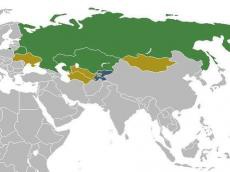|
|
TODAY.AZ / Analytics
Single currency as alternative way of dedollarization
31 March 2015 [12:30] - TODAY.AZ

By Laman Sadigova
Experts from Russia, Kazakhstan, Belorussia, Armenia and Kyrgyzstan continue their discussion on creation of a single currency in the Eurasian Union. The main problem, according to analysts, is a different degree of economic developments within the economic zone.
The possibility of creating a monetary union and a common currency was discussed at the design stage of the Eurasian Union project.
Forming a new single monetary union will allow members of the Eurasian Union not to depend on the laws and attitudes of third countries. This issue became especially relevant in light of today's problems in the relations between the U.S. and Russia.
Truth is, it is quite difficult to imagine such an alliance, considering the situation in which countries are now involved in. The main question now to be answered is whether Russia can become some kind of donor and stimulator within such a union. Turning the ruble into a regional currency has been an idea which continues to float however, as it could really boost regional trades and strengthen all country-members on a global level.
However, the ongoing devaluation of the ruble has complicated things and made discussions more difficult. The state of the currency depends on the energy sources and external economic relations.
Kazakhstan has already rejected the offer of the ruble becoming a single currency as it fears it will lose its independence to Russia. It claims, the Russian economy will swallow that of Kazakhstan, which economy is 14 times smaller than that of Russia. The economy of Belarus is only 3 percent of that of Russia.
The fact is that the national currency is a key feature of the country's sovereignty, and the leaders of Kazakhstan and Belarus have painfully reacted to the idea they could lose such a token of their independence.
In addition to problems linked to the formation of a single macroeconomic, finance and monetary, credit and fiscal policies in view of creating a single currency system, there are other issues to consider - for example which power will emit such a currency.
Undoubtedly, there can be only one center, and one common monetary policy, otherwise chaos will ensue. But who or what power will control that center?
It does not seem wise to give all the control to one of the CU leader, because it will face the discontent of the other members of the Union. On the other side, creating collective forms of control requires close coordination of all financial and economic policies, and this will require a great deal of time and patience.
Under the sanctions brought against Russia, the country is interested in extracting itself from under the economic and financial pull of the U.S. The idea of de-dollarization is now widespread in the post-Soviet space.
URL: http://www.today.az/news/analytics/139487.html
 Print version
Print version
Connect with us. Get latest news and updates.
See Also
- 08 November 2024 [18:57]
Liberation of Shusha: Intersection of History and Strategy - 07 November 2024 [20:45]
From press to politics or sympathy to hatred: Gallup's downbeat survey on Pashinyan's rating - 01 November 2024 [11:05]
Sustainable development is one of goals of COP29 - 31 October 2024 [13:50]
New trains, green lanes: Azerbaijan's journey to COP29 readiness - 28 October 2024 [17:10]
Lukewarm wishes from Yerevan - How sincere is Pashinyan in congratulating his Georgian counterpart? - 25 October 2024 [09:00]
Azerbaijan expands IFC partnership to enhance energy efficiency and sustainable development - 24 October 2024 [16:54]
Georgia under Western pressure - 23 October 2024 [13:28]
Azerbaijan becomes leader of Central Asia-Europe energy corridor - 23 October 2024 [08:30]
SOCAR's sustainable initiatives ahead of COP29: Paving way for carbon-neutral future - 22 October 2024 [19:57]
Islamophobia in France – Policy continuing since 20th century
Most Popular
 Dashnaks Influencing the European Parliament and Threatening EU Leadership
Dashnaks Influencing the European Parliament and Threatening EU Leadership
 Donald Trump's victory, Macron's hypocrisy and President Ilham Aliyev's indisputable arguments
Donald Trump's victory, Macron's hypocrisy and President Ilham Aliyev's indisputable arguments
 Armenia Challenges the West's Influence
Armenia Challenges the West's Influence
 Azerbaijani carpet expert awarded in South Korea
Azerbaijani carpet expert awarded in South Korea
 Boeing union members accepted corporation's latest offer
Boeing union members accepted corporation's latest offer
 Kazakhstan makes up over half of China's trade turnover with Central Asia
Kazakhstan makes up over half of China's trade turnover with Central Asia
 Export growth rate accelerates, breaking record in past month
Export growth rate accelerates, breaking record in past month
